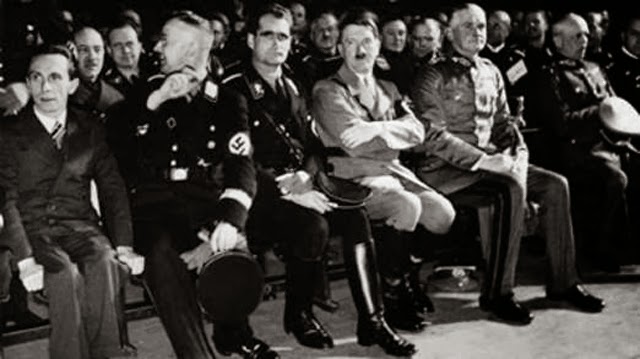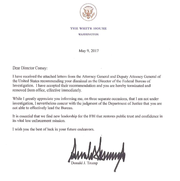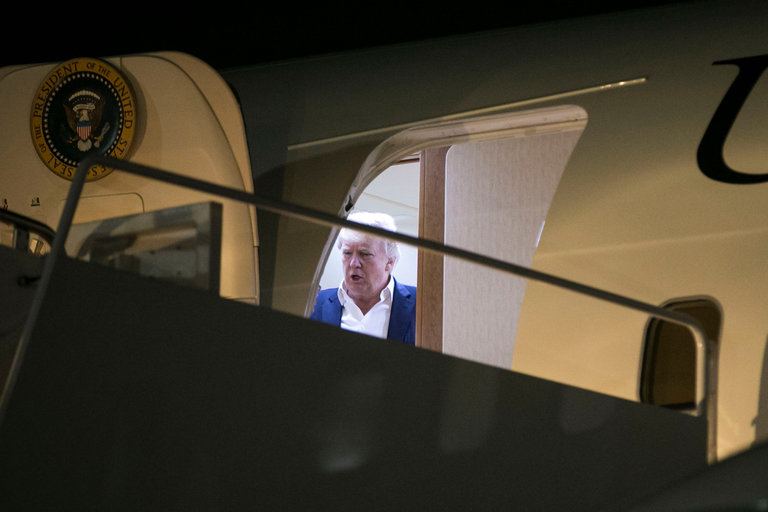
Don’t see big “principle” in Comey firing, just right-wing power elite back-stabbing. Less Watergate & more like Third Reich style purge, w SA / SS / Gestapo / Nazi party leaders all going after each other. Russia investigations have hardly been visible, tho Trump stupidity may now revive them. Little doubt Comey’s “mildly nauseous” statement was his undoing – Trump can’t abide even remote personal slight. Russia investigations ALWAYS dependent on few Senate RPBs — McCain, maybe Lindsey Graham — who hate Trump and realize how dangerous he is to US position in the world. Hard to put much faith in the FBI re Russia or anything else. As for Russia inquiries, given Keystone Cops routine, think we’re better off sub-contracting it to Macron and the French. Top, Hitler / Goebbels / Rudolf Hess / Himmler / Goering / Ernst Rohm et al in happier times. Bottom: Trump arriving at Joint Base Andrews on Sunday, after anti-Comey “Twittersturm”
President Trump’s decision on Tuesday to fire James B. Comey, the F.B.I. director
who had been leading an investigation into possible ties between his campaign and Russia,
came in a bombshell announcement that left Washington reeling.
But it had been a long time coming.
Whatever the stated reasons, Comey’s ouster was the abrupt culmination of a toxic dynamic between him and Trump that had unfolded slowly over more than a year.
The relationship began to sour during the presidential campaign over Comey’s exoneration of Hillary Clinton in the F.B.I.’s investigation of her email practices,
which ran counter to Trump’s “Lock her up!” message to his supporters.
It grew still more bitter after Trump became president and Comey declined to back up his accusation that President Barack Obama had spied on him.
And it reached a nadir when F.B.I. director confirmed in sworn testimony in Congress that the bureau was investigating ties between Trump’s campaign team and Russia.
Administration aides said Tuesday that senior White House officials at White House & Justice Department had been charged with building a case to justify Comey’s firing since at least last week,
and that Attorney General Beauregard “Bag Man” Sessions had been tasked with coming up with reasons to fire him.
That rationale, set forth in a pair of letters from Sessions and Rod J. Rosenstein, the deputy attorney general, was completely and visibly ludicrous:
that Comey had mishandled the Clinton emails investigation by, among other things,
releasing “derogatory information” about her as he closed the case and said she should not be prosecuted.
But that explanation ran counter to Trump’s message as recently as last week:
that Comey had treated Clinton too well, not too harshly, during the investigation.
“F.B.I. Director Comey was the best thing that ever happened to Hillary Clinton in that he gave her a free pass for many bad deeds!”
Trump said in a posting on Twitter last week.
Comey’s dismissal comes after a period in which the president has engaged in a remarkably public effort
to undercut an active investigation into his presidential campaign, repeatedly denouncing the inquiry and dismissing it as meritless.
But the final straw appeared to be Comey’s appearance at a Capitol Hill hearing last week,
in which he testified that while he was “mildly nauseous” to think he might have influenced the outcome of the presidential election,
he had no regrets about his handling of the Clinton investigation.
The ill will dates to last summer, when the F.B.I. director took the extraordinary step of going public in the thick of the presidential campaign
with his conclusion that Clinton could not be prosecuted for her use of a private email server to handle classified documents.
Trump told aides at the time Clinton should have been charged,
according to one person close to him who spoke on the condition of anonymity without authorization to speak for the president.
That was a view Trump often shared with voters on the campaign trail.
“He saved Hillary Clinton from facing justice for her illegal and corrupt actions,” he said of Mr. Comey at a rally in Tampa, Fla., the next month.
“They were illegal and they were corrupt, and the F.B.I. saved her,
and I would imagine many people within the F.B.I. are extremely embarrassed — extremely.”
But as Election Day neared and Comey went public again —
this time alerting Congress that new emails had come to light in the Clinton matter —
Trump said his opinion of Comey had improved.
“I have to tell you, I respect the fact that Director Comey was able to come back after what he did,” Trump said in Phoenix in October. “I respect that very much.”
In Grand Rapids, Mich., Trump said, “It took guts for Director Comey to make the move that he made in light of the kind of opposition he had.”
“I was not his fan,” he said at the time, “but I’ll tell you what: What he did, he brought back his reputation. He brought it back.”
Still, after his victory in November, Trump was irate with the suggestion, put forth by many Democrats and ultimately Clinton herself,
that he would not have won but for Comey’s actions.
He ultimately had to be persuaded to keep Comey, the person close to him added.
Even then, the president made it clear he could change his mind at any moment.
In November, Trump suggested in an interview with CBS’s “60 Minutes” that Comey’s fate could hinge on whether he was able to satisfy the president that his handling of the Clinton investigation had been justified.
“I would certainly like to talk to him and see him” before making a decision about whether to keep Comey, Trump said then.
“This is a tough time for him, and I would like to talk to him before I’d answer a question like that.”

Document: White House Announces Firing of James Comey
He added, “I’d want to see, you know, he may have had very good reasons for doing what he did.”
Trump’s disdain for Comey intensified at the beginning of March,
when the president wrote Twitter posts accusing Obama of wiretapping his telephone at Trump Tower.
The next morning, word spread quickly Comey wanted the Justice Department to issue a statement
saying that he had no evidence to support the president’s accusation,
although no such statement was released — thanks to Beauregard “Bag Man” Sessions.
For weeks afterward, Trump insisted that his accusation was correct.
In dramatic testimony later in March, Comey said he had no information to back up the president’s allegations
even as he confirmed the existence of an F.B.I. investigation into Trump’s campaign.
That set up a remarkable dynamic — an F.B.I. director directly contradicting a sitting president
at the same time the bureau was pursuing a possible criminal inquiry into whether the president’s associates had colluded with Moscow to tilt the election to him.
Last month, Trump reiterated that Comey might not be on solid ground,
telling Fox News that “it’s not too late” to fire him, even as he said he had confidence in his F.B.I. director.
“We’ll see what happens; it’s going to be interesting,” Trump told Fox.
“Don’t forget, when Jim Comey came out, he saved Hillary Clinton — people don’t realize that. He saved her life.”
There had long been odd body language between Trump and Comey.
In January during a ceremony at the White House to honor law enforcement officials, Trump singled out Comey and called him over,
shaking his hand and patting him on the back while whispering something inaudible in his ear.
“He’s become more famous than me,” Trump said in the Blue Room, a dubious comment from a president who enjoys being the focus of attention.
Source: Trump and Comey: An Abrupt Ending That Was a Year in the Making – The New York Times
